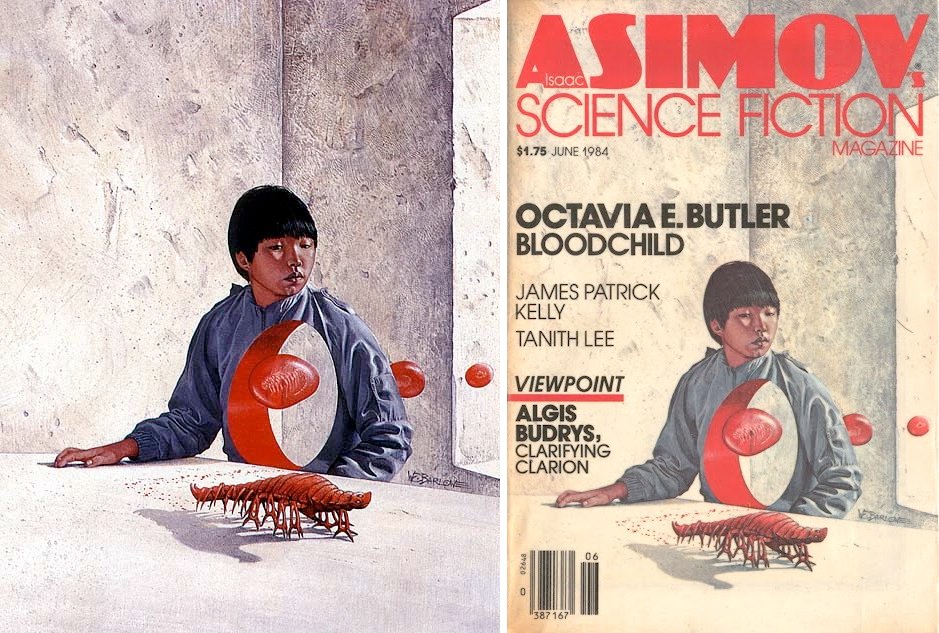Research
Image description: cover of Asimov Science Fiction magazine from 1984 advertising Octavia Butler’s short story Bloodchild with cover art abstractly depicting the story.
Keywords: reproduction, transgender studies, speculative fiction, sex & gender, sexuality, feminist & queer theory, state reproductive violence, disability studies, nationalism, imperialism, bodies borders & babies, assisted reproductive technologies, utopia, desire, gender-affirming care, potentiality, technology, American reproductive imaginaries, fertility markets, citizenship, queer family making.
Dissertation – Trans Reproduction and Family
Transsexualizing Reproduction: Speculating Transgender Reproductive Politics, Desire, and Time in the United States
My dissertation and forthcoming book manuscript, Conceiving Transgender Reproduction in America, is the first full-length study of transgender fertility and reproductive politics in the U.S. Bringing together transgender studies, medical sociology, disability studies, and the history of science and race, the project reimagines reproductive justice not only as a matter of access, but as a speculative and world-building endeavor.
Drawing on archival research, legal analysis, and over 100 interviews, I examine how trans reproduction has been shaped by racialized fertility science, binary sex logics, and shifting state technologies of governance. The project unfolds in three parts:
First, I excavate the history of scientific speculation about trans pregnancy and the fantasy of the "pregnant man" as it emerged alongside IVF.
Second, I analyze how contemporary anti-trans legislation leverages speculative fears about fertility to justify restrictions on gender-affirming care.
Third, I turn to qualitative interviews with trans individuals to explore how they imagine and enact alternative reproductive futures, including speculative kinship, lab-grown gametes, and queer family-making.
A chapter of this work was published in Feminist Theory, where I propose a transfeminist framework for rethinking pregnancy beyond binary logics. Overall, the dissertation challenges assumptions that trans reproduction is new, marginal, or anomalous and instead positions it as central to understanding how the U.S. regulates gender, sexuality, and the nation-state through reproductive governance.
Bodies, Borders, and Babies
Transnational Reproductive Politics, Race, and the Nation-State
My second line of research examines how reproductive politics are mobilized in the service of racial nationalism, with particular attention to the U.S.-Mexico border and immigration policy. I conceptualize “reproductive outsiders” as those systematically excluded from normative reproductive citizenship, those whose fertility is either restricted or coerced to serve the interests of the state.
My article in Signs introduces this concept by examining two pivotal legal cases involving Latina migrants: Madrigal v. Quilligan, a case of coerced sterilization in 1970s California, and Azar v. Garza, in which a detained minor was denied access to abortion in 2017. Through these cases, I trace how racialized reproductive control persists across time and takes distinct juridical forms, from forced sterilization to forced birth.
I have several articles under review in which I expand this research to include transnational abortion politics, reproductive travel across borders, and emerging fertility technologies within a framework that critically interrogates nationalism, race, and biopolitics.
Disability and Chronic Illness × Trans Studies
Access, Interdependence, and the Future of Care
I am currently a graduate researcher with Enduring Conditions: A Disability, Illness, and Care Collaboratory, a Mellon Foundation–funded initiative committed to building collective access and interdependent solidarity across disabled and chronically ill communities. Our work supports a national network of scholars, organizers, and culture workers engaged in accessible pedagogy, community-driven research, and creative care practices.
Grounded in the politics of disability justice, we highlight the often-invisible labor of curating access, model expansive and imaginative approaches to inclusion, and center the expertise of disabled and chronically ill people. This work aligns with my broader commitment to integrating disability studies with transgender studies, particularly in how both fields challenge normative timelines, institutional definitions of health, and the privatization of care.
Through this collaboration, I’m developing new approaches to access as a shared, collective practice not a retrofitted accommodation, but a starting point for rethinking scholarly life, reproductive politics, and community engagement.
